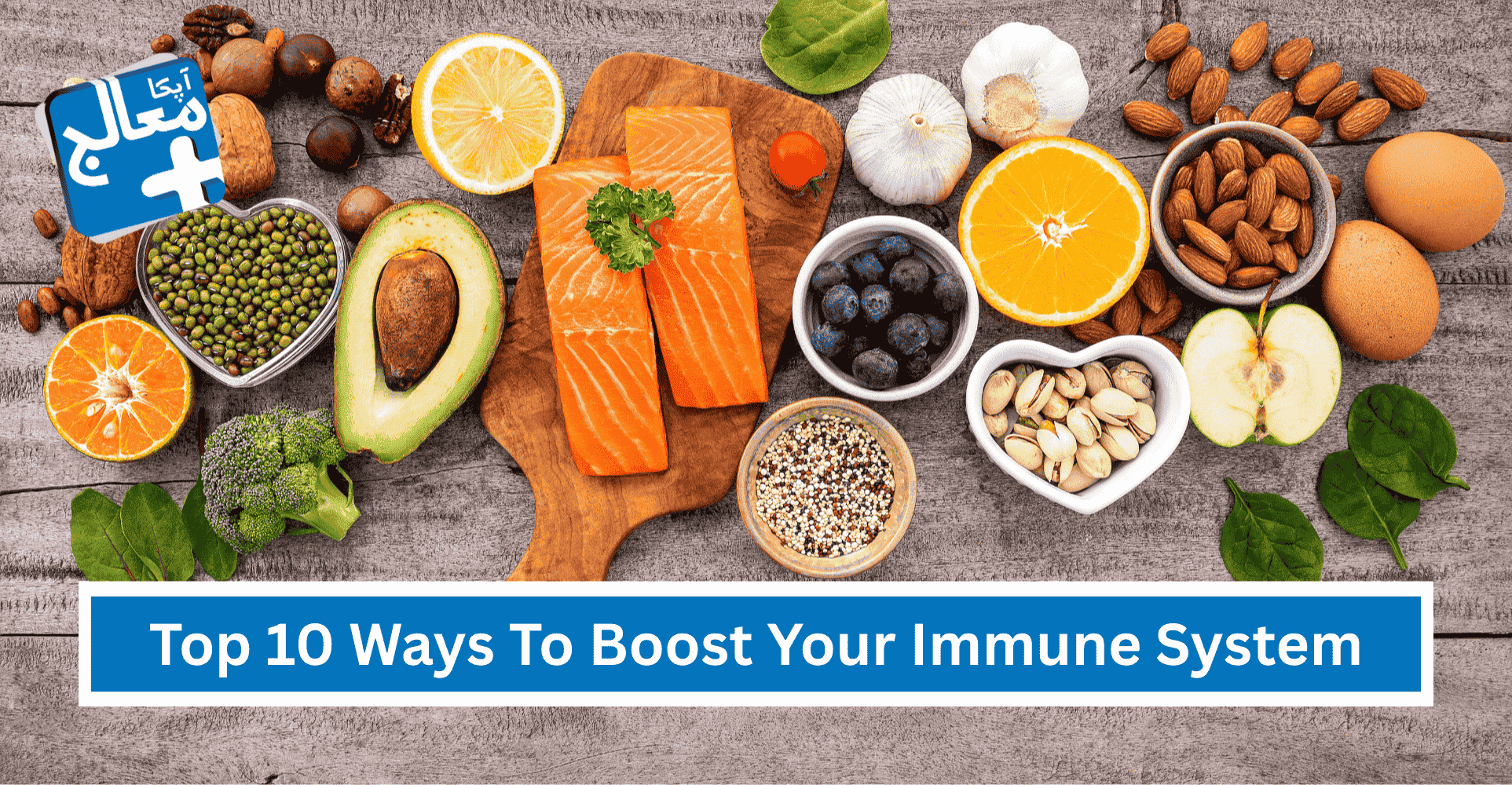Top 10 Ways To Boost Your Immune System: Doctor-Recommended Tips

The immune system is our body’s defense mechanism against infections and illnesses. It works around the clock to protect you from harmful viruses, bacteria, and other threats. Keeping it strong is essential for staying healthy.
Our immune system isn’t some magical superhero. It’s more like a tired bodyguard trying to keep things in order while you’re skipping sleep, stressing out, snacking on junk food, and doing every other thing that can make its efficacy drop.
The good news? A few simple, doctor-approved habits can help you boost your immunity and keep your body’s defense team in top shape. Let’s dive into this blog!
Also read: "13 Scientific Health Benefits of Moringa Oleifera for Men & Women"
10 Most Recommended Ways to Boost Your Immune System Naturally

Here are the 10 natural and easy ways to boost the immune system quickly:
1. Eat a Nutrient-Rich, Colorful Diet
Your immune system needs proper nourishment to function at its best, and that begins with what you eat. A balanced diet full of colorful fruits and vegetables supplies essential vitamins, minerals, and antioxidants that support immune cell activity. Nutrients like vitamin C, vitamin A, zinc, and selenium play a crucial role in reducing inflammation and fighting infections. Fermented foods such as yogurt, kefir, and kimchi help promote a healthy gut microbiome, which is closely linked to immunity. The more natural color variety on your plate, the more diverse the nutrients — and the stronger your immune defense.
2. Prioritize Quality Sleep
Getting enough sleep isn't just about feeling rested; it's about giving your body time to heal, regenerate, and prepare for another day. During deep sleep, the body produces infection-fighting cytokines and supports the performance of immune cells. Chronic sleep deprivation has been shown to reduce the effectiveness of your immune response, making you more susceptible to viruses and bacteria. Ideally, adults should aim for 7 to 9 hours of uninterrupted sleep each night to keep the immune system functioning properly.
3. Stay Hydrated Throughout the Day
Water plays a vital role in every system of the body, including the immune system. It helps carry oxygen to cells, flushes out toxins, and keeps the mucous membranes moist, which act as a barrier against pathogens. Dehydration can slow down lymphatic circulation and hinder immune responses. Drinking adequate water, generally around 8 to 10 glasses per day, is a simple but powerful way to support your body's natural defenses.
4. Exercise Regularly in Moderation
Physical activity improves circulation, reduces inflammation, and enhances the movement of immune cells throughout the body. It also helps lower stress hormones, which can suppress immune function when elevated for long periods. You don’t need intense workouts every day; even moderate activities like walking, yoga, or cycling can significantly benefit your immune health. Consistency is more important than intensity, and over-exercising without proper rest may weaken immunity
5. Manage Stress with Healthy Coping Techniques
Chronic stress has a significant impact on the immune system. When you're under prolonged emotional or mental stress, your body increases cortisol production, which in turn reduces your immune system's ability to respond effectively. Over time, this can lead to higher susceptibility to infections and slower recovery times.
Also learn: "Walking vs Running - Which is Better for Human Health"
6. Get Adequate Sunlight or Vitamin D
Vitamin D is essential for a properly functioning immune system, and many people are unknowingly deficient in it. This vitamin helps regulate immune responses and reduces the risk of chronic inflammation. The most natural way to get vitamin D is through sunlight. Spending just 10 to 20 minutes in the sun a few times a week can help maintain healthy levels.
7. Limit Sugar and Processed Foods
What you leave out of your diet is just as important as what you include. High sugar intake can suppress the activity of white blood cells and increase inflammation, weakening the immune response. Similarly, heavily processed foods often contain artificial ingredients and unhealthy fats that may disrupt gut health and immune function.
8. Support a Healthy Gut
Around 70% of your immune system resides in your gut, which means maintaining good digestive health is directly tied to strong immunity. A healthy gut flora helps regulate immune function, reduce inflammation, and protect against harmful pathogens. Including probiotics like yogurt and fermented vegetables in your diet can help replenish beneficial bacteria.
9. Avoid Smoking and Limit Alcohol Consumption
Both smoking and excessive alcohol intake can significantly weaken the immune system. Smoking damages the respiratory tract and reduces the effectiveness of immune cells in the lungs, making the body more vulnerable to respiratory infections. Alcohol, particularly in large amounts, disrupts the balance of gut bacteria, interferes with liver function, and impairs the body’s ability to produce immune-boosting compounds. Quitting smoking and consuming alcohol in moderation (or avoiding it altogether) are powerful steps toward strengthening your immune defense.
10. Stay Up to Date with Vaccines & Practice Good Hygiene
Vaccines are one of the most effective tools in preventive healthcare. They train your immune system to recognize and respond more efficiently to certain infections. Keeping your vaccinations current, including seasonal flu shots and COVID-19 boosters, helps reduce your risk of severe illness. Alongside immunization, basic hygiene practices such as frequent handwashing, disinfecting surfaces, and safe food handling reduce your exposure to harmful microbes and help your immune system stay focused on more serious threats.
You may also like to read: "7 Amazing Health Benefits of Desi Ghee - Unlocking the Secrets"
Bottom Line:
Taking care of your immune system isn’t about quick fixes or miracle cures. Instead, it’s about building consistent, healthy habits that support your body’s natural defenses. From nourishing your body with whole foods to managing stress, getting enough sleep, and staying active, each small step adds up. By making these doctor-recommended changes part of your daily routine, you can strengthen your immunity and set the foundation for a healthier, more resilient you.
Talk to a licensed online doctor or the best nutritionist near you from all major cities of Pakistan, including Lahore, Islamabad, and Karachi, through Apka Muaalij. Book your consultation today by visiting the website or calling the quick support team (042) 32380001.
FAQs (Frequently Asked Questions)
1. What is the best vitamin to boost the immune system?
Vitamin C, D, and zinc are among the top nutrients known to support immune function.
2. Can exercise help my immune system?
Yes, regular moderate exercise improves circulation and helps immune cells move efficiently through the body.
3. Does sugar weaken your immune system?
Excessive sugar intake can suppress white blood cell function and increase inflammation, weakening your immune response.
4. How much sleep do I need for a healthy immune system?
Adults need 7–9 hours of quality sleep per night to allow the body to repair and restore immune balance.
5. Can stress make you sick?
Chronic stress weakens your immune system and makes you more susceptible to colds, infections, and even chronic diseases.
6. Is gut health linked to immunity?
Absolutely. A healthy gut microbiome supports immune regulation and protects against harmful pathogens.

Ifra Sarwar
Ifra Sarwar holds a degree in Dietetics and Nutritional Sciences from the University of Faisalabad and West Virginia University. With experience as a hospital nutritionist and at Nutrifactor, she blends clinical expertise with evidence-based insights. Passionate about sharing accurate health information, she writes to educate and empower. Outside of work, Ifra enjoys listening to true crime podcasts and stand-up comedy.